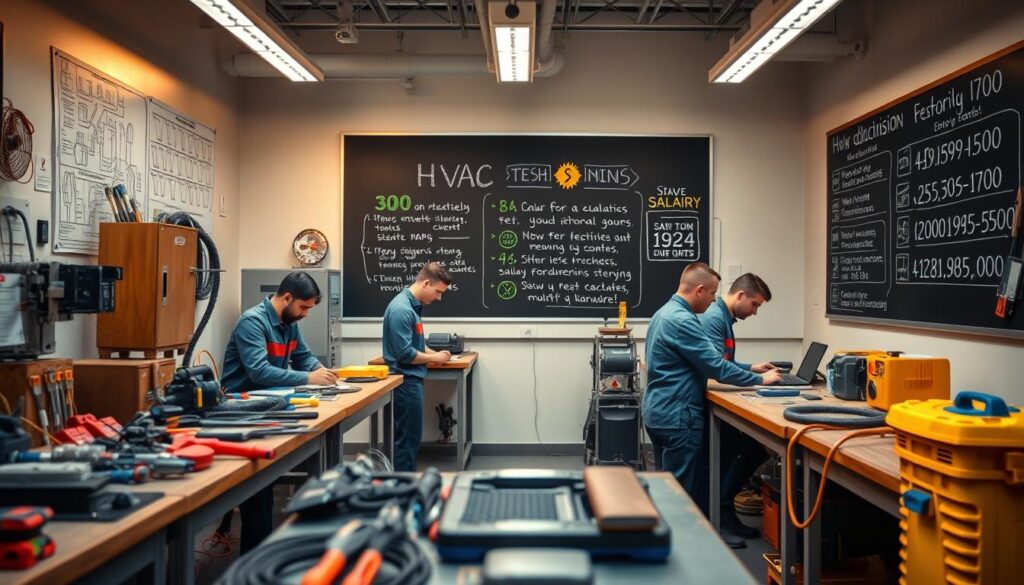Affiliate Disclosure
HVAC Guide Guys is a participant in the Amazon Services LLC Associates Program, an affiliate advertising program designed to provide a means for sites to earn advertising fees by advertising and linking to Amazon.
How Much Do HVAC Workers Make a Year? Are you thinking about a career in heating, ventilation, and air conditioning? HVAC offers more than just technical skills. It also offers a rewarding career with good pay.

Knowing how much HVAC workers make can change your mind about this career. Entry-level HVAC technicians earn a median of $54,100 a year. This makes it a great choice for skilled workers.
Your salary in HVAC depends on many things. These include your experience, where you work, your specialty, and how much demand there is. This guide will help you understand how much you can earn. It will also help you plan your career.
Key Takeaways
- Entry-level HVAC technicians can expect a median annual salary of $54,100
- Salary varies significantly based on geographic location
- Certifications and specialized skills boost earning
- The HVAC industry shows strong job growth and stability
- Career advancement opportunities can substantially increase income
Table of Contents
Understanding the HVAC Industry Salary Landscape
The HVAC industry is a growing field with good job stability and pay. As technology improves and energy efficiency matters more, HVAC installers play a key role. They are at the heart of a vital service sector.
For those looking into technical careers, the HVAC market offers great chances. Your salary as an HVAC installer can change a lot. This depends on several factors that shape the industry’s pay.
Current Market Dynamics
The Bureau of Labor Statistics sees big growth in the HVAC field. They predict 40,100 more jobs by 2033. This means a lot of demand for skilled technicians who can handle complex systems.
Key Factors Influencing HVAC Salaries
- Geographic location and regional market demand
- Professional certification and specialized skills
- Years of practical experience
- Industry specialization (residential vs. commercial)
- Technological proficiency
Industry Growth Projections
As the industry gets more tech-savvy, your earnings can rise. New energy-efficient systems and smart home tech open doors for skilled workers. They can adapt and specialize.
The future of HVAC careers looks bright, with increasing demand and competitive compensation packages.
Those who keep learning and stay up-to-date with tech will see big salary increases. This field is always changing, and those who adapt will thrive.
Explore Our HVAC Shop
Looking for top-rated HVAC tools, parts, and accessories? Visit our shop and find the perfect solution for your needs.
Visit the ShopHow Much Do HVAC Workers Make a Year
Thinking about a career in HVAC? It’s important to know how much you can earn. HVAC service pay changes a lot. It depends on your experience, where you work, and what you specialize in.
Recent data shows typical HVAC worker salaries:
- Entry-Level Technicians: Make about $54,100 a year
- Intermediate Technicians: Earn an average of $65,700
- Senior HVAC Professionals: Can make up to $77,200 annually
“Your earning in HVAC grows a lot with experience and skills.” – HVAC Industry Experts
Many things affect how much you can earn. These include:
- Job roles like installers, service techs, and sales
- Where you work
- How certified you are
- What area of HVAC you specialize in
The national average salary for HVAC workers is promising. With ongoing training and skill improvement, you can boost your earnings. This can lead to a stable, fulfilling career in HVAC.
Geographic Salary Variations Across States
Exploring hvac career wages shows how important geographic salary variations are. Different states have unique compensation landscapes. This can greatly affect your earnings.
Your hvac trade income can change a lot based on your location. Several factors affect these regional differences. These include local economic conditions, demand for HVAC services, and cost of living.
Highest Paying States for HVAC Professionals
Some states pay HVAC technicians very well. These top-paying regions offer great opportunities for skilled professionals:
- California: Average annual salary around $59,200
- New Jersey: Competitive wages reaching $58,300
- Washington: Strong market with salaries near $58,000
Lowest Paying States for HVAC Technicians
Even though some states pay less, there are opportunities for motivated professionals:
- Wyoming: Median salary around $49,600
- Mississippi: Average earnings near $49,500
- West Virginia: Wages approximately $49,200
Regional Salary Dynamics
Urban areas usually pay more than rural areas. Cities with strong construction and tech sectors offer better hvac career wages.
| Region | Average Annual Salary | Job Market Strength |
|---|---|---|
| West Coast | $55,000 – $62,000 | Very Strong |
| Northeast | $52,000 – $59,000 | Strong |
| Midwest | $48,000 – $54,000 | Moderate |
| South | $45,000 – $52,000 | Growing |
Your location greatly affects your earnings in the HVAC industry. Research local markets and find opportunities that match your career goals.
Explore Our HVAC Shop
Looking for top-rated HVAC tools, parts, and accessories? Visit our shop and find the perfect solution for your needs.
Visit the ShopExperience Levels and Corresponding Pay Scales
Your earnings in the HVAC field greatly depend on your experience. Knowing how much you can earn helps you plan your career. It also sets realistic salary goals.
HVAC workers see their salaries grow as they get more skilled. Here’s how salaries usually increase:
- Entry-Level Technicians (0-2 years)
- Median annual salary: $54,100
- Learning basic skills
- Doing simple installations and maintenance
- Intermediate Technicians (2-4 years)
- Median annual salary: $65,700
- Better technical skills
- Handling more complex repairs
- Experienced Technicians (4-7 years)
- Median annual salary: $77,200
- Advanced troubleshooting
- Deeper system knowledge
- Supervisory Roles (7+ years)
- Median annual salary: $90,800
- Managing others
- Leading with technical expertise
“Your skills and expertise directly translate to higher hvac profession salaries. Continuous learning is key to career advancement.” – HVAC Industry Expert
Investing in your skills, getting certifications, and gaining experience boosts your salary. This is true in the HVAC industry.
Top-Paying Cities for HVAC Professionals
When you think about a career in HVAC, where you live matters a lot. Some cities pay HVAC technicians a lot more, making them great places to work.
The best cities for HVAC technician jobs show big salary differences across the U.S. These differences come from things like the local economy, how much people need HVAC services, and the cost of living.
| City | Average Annual Salary | Key Factors |
|---|---|---|
| San Francisco, CA | $64,200 | High tech industry presence |
| New York City, NY | $60,600 | Dense commercial real estate |
| Newark, NJ | $59,900 | Industrial infrastructure |
| Seattle, WA | $59,200 | Growing tech and manufacturing sectors |
| Bridgeport, CT | $58,800 | Strong commercial service market |
When looking at where to start your HVAC career, think about these important things:
- How much HVAC work is needed in the area
- The cost of living in the city
- How much room you have to grow in your career
- How many other HVAC workers are there
Pro tip: While cities with high salaries are tempting, they can also mean higher living costs and tough job competition. Do your homework before deciding to move.
Explore Our HVAC Shop
Looking for top-rated HVAC tools, parts, and accessories? Visit our shop and find the perfect solution for your needs.
Visit the ShopCareer Advancement and Salary Growth
Your HVAC career has many ways to boost your earnings and grow professionally. Skilled technicians can increase their wages by developing their careers and learning more.

To move up in the HVAC field, you need technical skills, certifications, and a career plan. Knowing the opportunities and how to use them is key to your success.
Certification Benefits
Getting certified can really help your earning power. Important certifications to look into are:
- EPA 608 Certification for refrigerant handling
- NATE (North American Technician Excellence) certification
- HVAC Excellence Professional Level certification
Specialization Opportunities
Choosing a specific HVAC area can lead to better-paying jobs. Some areas to consider are:
- Commercial HVAC systems
- Industrial refrigeration
- Energy efficiency consulting
- Solar thermal systems
Management Paths
With experience, HVAC pros can move into leadership roles for higher pay. Possible career steps include:
- HVAC Service Supervisor
- Operations Manager
- Technical Sales Representative
- Business Owner/Entrepreneur
Strategic career development can help HVAC professionals increase their annual earnings by 30-50% over their initial entry-level wages.
Comparing HVAC Salaries to Other Trades
When looking at hvac trade income, it’s key to see how HVAC salaries stack up against other skilled trades. The construction and technical service fields have many career paths. Each offers different earning potentials.
Let’s look at the salary ranges for various trades:
- HVAC Technicians: Entry-level salaries around $54,100
- Plumbers: Median wage of $53,900
- Electricians: Starting salaries near $60,600
Your salary in the HVAC field depends on several important factors. Skills, ongoing training, and being tech-savvy can greatly boost your earnings. While electricians might earn more at first, HVAC techs often have more job security. This is because people always need climate control systems.
Technology advancements are vital for hvac trade income. As smart home tech and energy-saving systems improve, HVAC pros who keep learning can earn more.
The key to maximizing your HVAC profession salaries is staying ahead of industry trends and continuously upgrading your skill set.
Comparing trade salaries shows HVAC careers offer good pay with room for growth. Your commitment to learning and staying current can turn a good starting salary into a high-earning career.
Benefits and Additional Compensation
HVAC professionals get more than just a good salary. They also get a great benefits package and chances to earn extra. Knowing about these perks can help you make more money in your HVAC job.
HVAC technicians get more than just a salary. They get packages that help them grow in their careers and stay financially stable.
Standard Benefits Package
HVAC pros usually get a big benefits package. It includes:
- Comprehensive health insurance coverage
- Dental and vision plans
- 401(k) retirement savings programs
- Paid vacation and sick leave
- Disability and life insurance
Performance Bonuses
Many HVAC companies give bonuses for great work. These bonuses can be $500 to $5,000 a year. They depend on how well you and your team do.
| Performance Level | Bonus Potencial |
|---|---|
| Entry-Level Technician | $500 – $1,500 |
| Experienced Technician | $1,500 – $3,000 |
| Senior Technician | $3,000 – $5,000 |
Commission Structures
Sales-focused HVAC workers can earn more through commissions. Your earnings can grow by:
- Selling extended service contracts
- Recommending system upgrades
- Introducing energy-efficient solutions
- Generating new customer leads
These extra ways to earn show why HVAC jobs are more than just a good salary. By planning your career, you can earn even more.
Explore Our HVAC Shop
Looking for top-rated HVAC tools, parts, and accessories? Visit our shop and find the perfect solution for your needs.
Visit the ShopEducation Requirements and Salary Impact

Starting a career as an HVAC technician means understanding the educational paths that can raise your salary. Many start with a high school diploma. But, choosing the right education can greatly affect your income.
Your HVAC career begins with basic education:
- High school diploma or equivalent
- Technical or vocational training programs
- Community college associate degrees
- Apprenticeship programs
Investing in education can really pay off. An associate degree in HVAC technology can give you a salary boost of 10-20%.
| Education Level | Average Starting Salary | Career Advancement |
|---|---|---|
| High School Diploma | $35,000 – $42,000 | Limited |
| Technical Certificate | $40,000 – $48,000 | Moderate |
| Associate Degree | $45,000 – $55,000 | High |
Apprenticeships mix classroom learning with real-world training. They last 3-5 years and lead to becoming a skilled HVAC technician with good pay.
Investing in your education is the fastest route to maximizing your HVAC career.
Certifications from HVAC Excellence or NATE show your skills and can raise your salary. These certifications prove your advanced knowledge and dedication to HVAC.
Industry Demand and Job Security
The HVAC industry is a stable place to work. The Bureau of Labor Statistics says there will be 40,100 new jobs by 2033. This makes hvac career wages very promising for those with skills.
New technologies are changing how we earn in the HVAC field. Your success depends on a few important things:
- More construction projects across the country
- More need for energy-saving climate systems
- Old HVAC systems need to be replaced
- New green technologies are coming
Those who keep up with new tech can see big salary increases. Smart home technologies and sustainable cooling solutions are very profitable areas to focus on.
The HVAC technician job market is strong in many areas. Homes, businesses, and factories all need HVAC services. This means steady work and good pay for skilled workers.
Being adaptable and always learning is key to a secure and rewarding HVAC career.
Explore Our HVAC Shop
Looking for top-rated HVAC tools, parts, and accessories? Visit our shop and find the perfect solution for your needs.
Visit the ShopCommercial vs Residential HVAC Salaries
When looking at how much HVAC workers earn, it’s key to know the difference between commercial and residential work. The pay for HVAC contractors changes a lot based on the type of job they do.
Working in commercial or residential HVAC can help you earn more. Each area has its own challenges and benefits that affect how much you get paid.
Sector-Specific Salary Differences
- Commercial HVAC usually pays 15-25% more than residential work
- Industrial systems need more advanced skills
- Bigger projects can lead to higher earnings
Specialization Benefits
Choosing a specific HVAC area can boost your earning power. Specialized technicians often get paid more because of their deep knowledge and skills.
Career Path Options
- Begin with residential HVAC for basic experience
- Get advanced certifications for commercial systems
- Move to industrial or specialized markets for better pay
Your HVAC career path can change a lot based on your choices. Knowing the salary differences helps you plan your career wisely.
Conclusion
The HVAC industry is full of chances for a stable and fulfilling career. Knowing how much HVAC workers make a year shows a field with big earning possibilities. Your salary can grow a lot as you gain skills and move up in your career.
Your salary depends on many things like where you work, your skills, and certifications. Salaries range from $54,100 for beginners to $90,800 for those with experience. By always learning and improving your skills, you can earn more in this growing field.
The HVAC industry is growing fast, making it a great choice for those looking for a secure job. Whether you want to work in homes or businesses, your hard work and ability to adapt will help you get better jobs. This is a key field for making money and growing your career.
As new technologies and green concerns grow, HVAC experts who keep up will find great opportunities. Your career in HVAC can be both profitable and rewarding. There are many ways to grow and specialize in this field.

